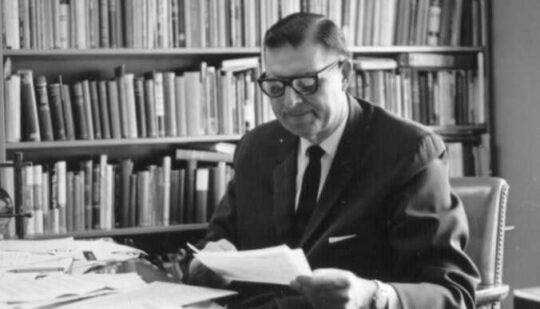Do What is Right, Don’t Just Oppose What is Wrong
You may not know the name Carl F. H. Henry. He was a towering figure in American Christianity less than a century ago. He founded Christianity Today magazine, Fuller Theological Seminary, and a number of other important Christian organizations. He also wrote one of my favorite books, The Uneasy Conscience of Modern Fundamentalism.
When Henry uses the terms fundamentalism or fundamentalist, he is not using them as an insult. He counted himself a fundamentalist. He meant it to refer to Christians who, among other things, believe Scripture to be inerrant. While fundamentalists agreed on Scripture, they did not always agree about how to treat resources other than Scripture. Christians still do not agree.
Should Christians pick through philosophy and social sciences, eating the meat and discarding the bones? Or should we just stick to what we know to be true—Scripture—for all our instruction?
The point of this article is not to convince you of either side in that debate. You can listen to our podcast episode on the topic. My point is to consider a warning Dr. Henry wrote in 1947 which we still need to hear today.
Writing about the majority-culture Christianity of his day, Henry observed, “Fundamentalism in revolting against the Social Gospel seemed also to revolt against the Christian social imperative.” (1)
Henry was observing a theological movement called the Social Gospel which is basically moralism, falsely teaching that Christians are made right with God by what they do. Henry was not suggesting that Christians become moralists. But he reminded them they must be moral. Christians were right to revolt against the Social Gospel, but they missed the mark in revolting against the Christian social imperative, too.
Christians are people who care about truth. We want to get things right. We want to oppose what is false, especially false teachings with potential to confuse and distract Christians.
But if we’re not careful, this instinct can be corrupted by pride, leading us to extremes. We can assume that non-Christians never say true things or that we are above learning from them. This was Henry’s concern in 1947. He saw Christians ignoring problems like poverty and racism and was distraught, especially as he read his Bible and saw the imperative commands to care for the poor and love one’s neighbor.
Christians in Henry’s day rightly opposed theological error. But they forgot that while they were opposing error they also had to walk in the truth. The theological errors of our day might be different, but we can fall into the same trap.
Opposing error is part of what it means to be a Christian, but it should never be mistaken for the sum-total of faithfulness. We may not like the way some Christians go about confronting racism, thinking that their efforts are corrupted by bad theology, Critical Race Theory, or anything else. But it could also be that they are doing a better job loving their neighbor than we are at loving ours.
Scripture has a lot to say about opposing partiality (James 2), love of God and neighbor (Mark 12:30–31), and God’s concern for justice (Proverbs 11). While we’re busy opposing error, let’s remember to obey God’s commands for how we treat each other. If we must criticize, let it be constructive. May love for God and neighbor rule.
1. Carl F.H. Henry, The Uneasy Conscience of Modern Fundamentalism (Grand Rapids: Eerdmans, 1947), 22.
Prayer Requests:
- Thank God for prophetic voices from whom we can still learn.
- Pray that God gives us concern to do what is right, not just oppose what is wrong.
- Pray for eyes to see ways pride might be sneaking into our thinking.












